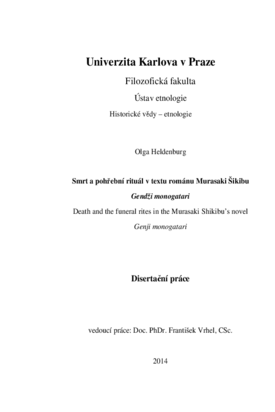Smrt a pohřební rituál v textu románu Murasaki Šikibu Gendži monogatari
Death and the burial rites in the Murasaki Shikibu's novel benji monogatari
dizertační práce (OBHÁJENO)

Zobrazit/
Trvalý odkaz
http://hdl.handle.net/20.500.11956/72946Identifikátory
SIS: 104239
Katalog UK: 990017801560106986
Kolekce
- Kvalifikační práce [24984]
Autor
Vedoucí práce
Oponent práce
Nymburská, Dita
Tirala, Martin
Fakulta / součást
Filozofická fakulta
Obor
Etnologie
Katedra / ústav / klinika
Ústav etnologie
Datum obhajoby
2. 6. 2014
Nakladatel
Univerzita Karlova, Filozofická fakultaJazyk
Čeština
Známka
Prospěl/a
Klíčová slova (česky)
Japonsko, obřady, Gendži monogatari, smrt, pohřeb, rituály, smutek, truchlení, mono no aware, mogari, dočasné pohřbení,japonská literatury, japonská kultura, japonská estetikaKlíčová slova (anglicky)
Japan, rituals, Genji monogatari, death, burial, funeral, mourning, mono no aware, afterlife, japanese literature, japanese culture, japanese aestheticismPředmětem zkoumání této disertační práce je pohřební obřadnost v románu Murasaki Šikibu Gendži monogatari (Příběh prince Gendžiho). Analýza textu románu má za cíl probádat autorkou líčené představy o konci života, o záhrobní říši a o komunikaci s duchy či dušemi zemřelých a shrnout poznámky a popisy průběhu pohřebních rituálů včetně obřadů předpohřebních a vzpomínkových. Úkolem této disertační práce je vytvořit přehled pohřebních rituálů a představ o smrti popisovaných v textu Gendži monogatari. Na Příběh prince Gendžiho je tedy nahlíženo jako na dokument dobového myšlení, o nějž se můžeme při studiu pohřebních a vzpomínkových rituálu opřít. Hlavní metoda použitá při zpracování tématu je podrobný rozbor teoretických, praktických a estetických aspektů smrti popisovaných v románu Gendži monogatari. Formování představ heianské dvorské šlechty o smrti a záhrobí ovlivňovaly především kult předků, šintoismus, taoismus, buddhismus a šamanismus, které se spolu rovněž podílely na vytváření pohřebního kultu. Představy o záhrobní říši byly též velice rozmanité. Svět živých a svět mrtvých nebyly v pojetí tehdejších Japonců striktně rozděleny a duchové měli přístup do všech sfér života lidí. Komunikace s duchy živých a dušemi zemřelých zaujímá ve sledovaném období důležité místo. Obřady dočasného pohřbení...
The subject of this dissertation is funeral rites in the Murasaki Shikibu's novel, The Tale of Genji (Genji monogatari). The analysis of the text seeks to explore the author's depiction of the end of life, the afterlife, communication with spirits or souls of dead and to summarize the notes and descriptions of the proceedings of funeral rituals including 'before burial' and memorial ceremonies. The purpose of this dissertation is to create an overview of funeral rituals and ideas of death described in the text of Genji Monogatari. The Tale of Genji is considered a document which reflects contemporary thinking and can therefore be relied on for a study of funeral and memorial rituals. The main method used to develop the topic is a detailed analysis of theoretical, practical and aesthetic aspects of death described in the Genji Monogatari novel. The ideas of the Heian Court about death and the afterlife were mainly affecting the cult of ancestors, Shinto, Taoism, Buddhism and Shamanism, which also participated in the creation of the funeral cult. Ideas of the afterlife were also very diverse. The world of the living and the world of the dead, in the concept of old Japanese, were not strictly divided and spirits had access to all spheres of life. Communication with spirits of the living and the souls...
